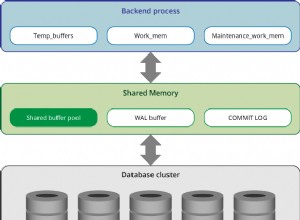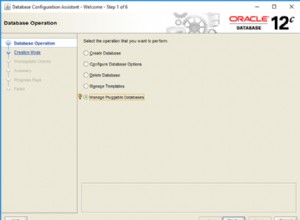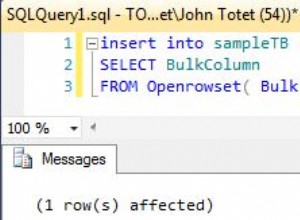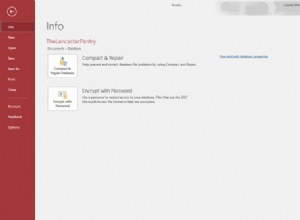Ecco un esempio completo, basato sulla risposta di @Pablo Santa Cruz e sul codice che hai pubblicato.
Non sono sicuro del motivo per cui hai ricevuto un messaggio di errore. Probabilmente è un problema con SQL Developer. Tutto funziona correttamente quando lo esegui in SQL*Plus e aggiungi una funzione:
create or replace and compile
java source named "RandomUUID"
as
public class RandomUUID
{
public static String create()
{
return java.util.UUID.randomUUID().toString();
}
}
/
Java created.
CREATE OR REPLACE FUNCTION RandomUUID
RETURN VARCHAR2
AS LANGUAGE JAVA
NAME 'RandomUUID.create() return java.lang.String';
/
Function created.
select randomUUID() from dual;
RANDOMUUID() -------------------------------------------------------------- 4d3c8bdd-5379-4aeb-bc56-fcb01eb7cc33
Ma continuerei con SYS_GUID se possibile. Guarda l'ID 1371805.1 su My Oracle Support:questo bug è stato presumibilmente corretto in 11.2.0.3.
MODIFICA
Quale è più veloce dipende da come vengono utilizzate le funzioni.
Sembra che la versione Java sia leggermente più veloce se utilizzata in SQL. Tuttavia, se utilizzerai questa funzione in un contesto PL/SQL, la funzione PL/SQL è circa due volte più veloce. (Probabilmente perché evita il sovraccarico del passaggio da un motore all'altro.)
Ecco un rapido esempio:
--Create simple table
create table test1(a number);
insert into test1 select level from dual connect by level <= 100000;
commit;
--SQL Context: Java function is slightly faster
--
--PL/SQL: 2.979, 2.979, 2.964 seconds
--Java: 2.48, 2.465, 2.481 seconds
select count(*)
from test1
--where to_char(a) > random_uuid() --PL/SQL
where to_char(a) > RandomUUID() --Java
;
--PL/SQL Context: PL/SQL function is about twice as fast
--
--PL/SQL: 0.234, 0.218, 0.234
--Java: 0.52, 0.515, 0.53
declare
v_test1 raw(30);
v_test2 varchar2(36);
begin
for i in 1 .. 10000 loop
--v_test1 := random_uuid; --PL/SQL
v_test2 := RandomUUID; --Java
end loop;
end;
/
I GUID della versione 4 non sono completamente casuale. Alcuni dei byte dovrebbero essere corretti. Non sono sicuro del motivo per cui è stato fatto, o se è importante, ma secondo https://www.cryptosys.net/pki/uuid-rfc4122.html:
La procedura per generare un UUID versione 4 è la seguente:
Generate 16 random bytes (=128 bits)
Adjust certain bits according to RFC 4122 section 4.4 as follows:
set the four most significant bits of the 7th byte to 0100'B, so the high nibble is "4"
set the two most significant bits of the 9th byte to 10'B, so the high nibble will be one of "8", "9", "A", or "B".
Encode the adjusted bytes as 32 hexadecimal digits
Add four hyphen "-" characters to obtain blocks of 8, 4, 4, 4 and 12 hex digits
Output the resulting 36-character string "XXXXXXXX-XXXX-XXXX-XXXX-XXXXXXXXXXXX"
I valori della versione Java sembrano conformi allo standard.




